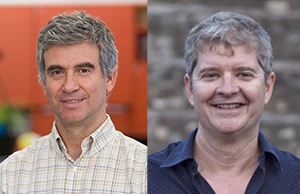
The Stanford Graduate School of Education has established two new endowed faculty chairs — one for the study of educational technology, the other for the study of poverty and inequality in education — and appointed, respectively, professors Dan Schwartz and Sean Reardon, as the inaugural recipients of these chairs.
“The GSE is working at the forefront of the most profound challenges of our country – creating greater equity in educational opportunities and harnessing technology for the benefit of learning,” said Dean Deborah Stipek. “These endowed professorships honor distinguished faculty as well as promote research and scholarship that helps us change education and change lives.”
Schwartz will assume the newly created Nomellini & Olivier Professorship of Educational Technology, which was created for a GSE faculty member whose teaching and research are focused on the exploration of how technological innovations can support learning, thinking and teaching in K-12 and higher education.
Schwartz studies the ways that technology can facilitate learning. Specifically working at the intersection of cognitive science, computer science and education, he examines cognition and instruction in individual, cross-cultural and technological settings. As the founder and director of the AAALab at Stanford, Schwartz works to bridge basic research on human reasoning and understanding with creative designs and experiments to improve STEM learning, often using computer technology. A former middle and high school teacher of math, science, reading and language arts, Schwartz taught in Kenya, Los Angeles and in Kaltag, an Athabascan village in Alaska, before undertaking a PhD in Human Learning and Cognition at Columbia University. In his most recent book, co-authored with former graduate student Dylan Arena, Measuring what matters most: Choice-based assessments for the digital age (MIT Press, 2013), Schwartz asserts that digital technologies have the ability to up-end current educational assessments that are overly focused on how much knowledge students have accrued and can retrieve. Given that much of what students learn in school today will be obsolete not too many years later, they need to develop skills as life-long learners. He therefore recommends evaluating students based on how well they learn, not just on how much they know. Technology, he argues, can measure how well we are educating students to be independent problem solvers and make good learning decisions.
The chair was endowed by Angela Nomellini ’75 and Ken Olivier ’74, who are long-time Stanford supporters and believe that technology can play a vital role in improving education outcomes, especially for disadvantaged children. In addition to their broad support across Stanford’s campus, they share a devotion to K-12 education and the Graduate School of Education. Nomellini now chairs the GSE advisory council and is a member of the Stanford New Schools board. Olivier, the former CEO and chairman of Dodge & Cox, is currently serving on the boards of the Stanford Management Company, the Stanford Institute for Economic Policy Research and the Freeman Spogli Institute.
Reardon is the inaugural holder of the Professorship of Poverty and Inequality in Education. The position was created for a member of the GSE faculty whose teaching and research are designed to understand how poverty and inequality shape educational opportunities and to inform policies that will improve educational outcomes for disadvantaged students.
Reardon received his doctorate in education in 1997 from Harvard University, and his work brings new and powerful empirical evidence to the debate about whether schools are capable of counteracting social inequalities in children’s families and neighborhoods. Working as an “educational epidemiologist,” Reardon examines patterns of academic achievement across the country. He has developed sophisticated statistical methodologies that enable him to analyze enormous data sets, some with up to 70 million individual test scores from 10 million students, to identify local and national patterns of academic achievement and achievement gaps. The methods he developed allow him to investigate the causes, patterns, trends and consequences of social and educational inequality and how educational policy affects these gaps.
In a current project, Reardon is using data from several thousand school districts to understand where racial and socioeconomic achievement gaps are smallest and what educational policies help to narrow them. In an earlier project, he assembled test score data from the past 50 years to measure the trends in racial and socioeconomic achievement gaps. This work documented, for the first time, the dramatic increase over the last four decades in the academic achievement gaps between students from high- and low-income families. This finding — coupled with the finding that racial gaps have narrowed considerably over the same time period — has received considerable attention from policy makers.
The chair was endowed by a charitable foundation directed by Angela ‘93 and David ‘90 Filo, who are committed to improving access to and success in college for low-income students. Their foundation also focuses on protecting civil liberties, environmental stewardship, public interest journalism and grassroots international efforts, especially those led by women.
Angela Filo, a HumBio major with a concentration in feminist studies, also holds a master’s degree in journalism from UC Berkeley. She taught photography and journalism for many years at Eastside College Preparatory School in East Palo Alto. A former member of the advisory council for the Stanford Initiative to Improve K-12 Education and her 20th reunion committee, she currently serves on the GSE advisory council. David Filo is the co-founder of Yahoo!, where he currently serves as a key technologist, directing the technical operations behind the company's global network of Web properties. He is credited with helping build Yahoo! into the world's most highly trafficked website and one of the Internet's most recognized brands.
“These professorships highlight two areas of research and practice that are priorities at the GSE. They also enable us to recognize the enormous accomplishments and contributions of these two preeminent scholars on our faculty,” said Stipek. “These gifts go a long way toward helping the GSE achieve its goals of improving equality and quality in K-12 education.”
Subscribe to our monthly newsletter.